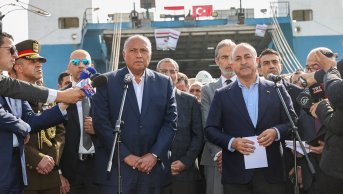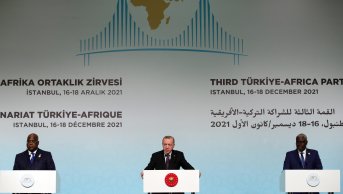Understanding the Normalization in Turkey-Israel Relations

After the deal is concluded, Israel’s attitude will show the significance that it attributes to the normalization and will answer whether it will change its policies toward Palestine and Gaza. In this sense, Ankara should consider the fact that Tel Aviv did not keep its promises several times in the past and because of this Turkey should be cautious in its rapprochement with Israel.
In the past five years, one of the most stressing issues in Turkish foreign policy was the strained relation with Israel. The situation created discomfort for Ankara, which has been trying to overcome its foreign policy challenges without the support of its traditional regional and international allies. This seems to end the normalization process that has gained momentum in the last period. The normalization of the relations with Israel corresponds to Turkey’s adopting a new approach in foreign policy. This is also important in order to understand what kind of foreign policy Ankara will follow in the following process. Furthermore, Turkey fell behind its activism of the previous years in foreign policy due to the recent crisis in the region and the political developments in the country. Therefore, it had to develop new perspectives in several fields, especially the relations with the powerful actors in the region. That is why it is necessary to interpret the current normalization process with Israel within this framework.
The crisis that has continued since 2009 in Israel-Turkey relations could not be solved with the effect of the uncertainty in the region during Arab revolutions. The most important factor for the two countries to consider normalization is the uncertain political environment which was a result of revolutionary uprisings in the Arab world. It is also important to mention that Turkey felt more pressure to normalize its relations with regional actors because of its own crisis in foreign policy. However, Ankara wants to take steps in order to overcome the state of being stuck with the effect of the crisis that Turkey has recently faced with Russia, Iran, United Arab Emirates and Egypt and the disagreements with the USA especially concerning PYD, the terror organization in Northern Syria.
Normalization with Israel is part of a broader foreign policy shift for Turkey. In recent months Turkish foreign minister initiated talks with the Emirati leadership in order to overcome the low density crisis between Ankara and Abu Dhabi. Turkey also expressed its willingness to solve the diplomatic crisis with Egyptian government. Even before that, under the Saudi mediation Turkey attempted to normalize its relations with Egypt. However, those talks had not bare fruit until the recent initiative by Turkey. Therefore, it is necessary to see Turkey’s openings in the foreign policy not only as a policy limited to Israel but also the piece of a more comprehensive strategy including all actors that can be considered influential in the region.
From the Israeli point of view, normalization talks were also crucial to realize. Tel-Aviv did not want Turkey to perform harsher attitudes towards Israel since 2009 and prevent acceleration of the crisis to the point of no return. In one sense, Israel had to take a step back and chose to meet the conditions of Turkey one by one. First, in March 2013, Netanyahu apologized Turkey, then the Israeli government accepted to pay compensation to those who lost their lives in the Mavi Marmara incident. Tel Aviv also accepted to meet with with Ankara in the conditions that Turkey set in terms of the removal of the blockade on Gaza. Even though Israel opposes to the complete removal of the blockade, it immediately accepted all the conditions demanded by Turkey.
Natural gas and oil
According to the compromise reached during the normalization talks, the materials for the construction of mosques, schools, industrial plants and health centers in Gaza will be transported to the region under Israeli control. Besides, Turkey will install power plants and water treatment plants which are among the most important needs in the region. Another plan that has recently been put forward due to the concerns of Israel is an airport and port project, which will be installed on the Mediterranean. According to this plan, an international airport and port will be installed on the shores of Gaza and it will be completely controlled by Israel. Tel-Aviv argues that this project would play a major role in removing the blockade on the local community and in ensuring the connection of the Gaza with the world. This plan that was not previously on the agenda has emerged recently when the Turkey-Israel deal is about to be concluded. This shows that the parties have already considered different formulas in order to lift the blockade on Gaza.
Another reason for the improvement of the relations in accordance with the normalization is the transfer of the energy resources of Israel and transport to other markets, particularly Europe. From this perspective, it is an accepted fact that both countries need each other in the energy field. Turkey seeks for alternatives in order to minimize its dependence to Russia and Iran on the natural gas and oil resources. This is particularly important given the recent crisis situation with Moscow and cool relations with Tehran. Additionally, Turkey also considers normalization with Egypt so both Ankara can have the opportunity to reach natural gas and oil reserves of Egypt. Therefore, a pipeline that passes through the Mediterranean will offer an important opportunity to Turkey within the scope of future energy products that will come from Israel, Egypt and Southern Cyprus.
The energy factor is seen as a much more important issue for Israel as well. The most suitable route for Israel to transport the natural gas that it will extract from the Mediterranean especially to the European market will pass through Turkey. Considering this, it is clearly understood why Tel Aviv has been more insisting on normalization of the relations with Turkey. Therefore, there is no doubt that such a convergence will yield serious economic returns to Israel. Furthermore, the deail will also give Turkey serious financial profits as the country will host the energy lines that will reach to European countries. It is reported that if the normalization being realized as planned, it is indicated that the natural gas line between Israel and Turkey may start to function as of 2019.
Quest for Strategic Cooperation
Another important issue for Israel is the improvement of political and strategic cooperation with Turkey. Having gone through a state of tension during the Arab revolutions, Israel realized in this process that it would not be able to ensure regional security without cooperating with a powerful ally like Turkey. It is an important factor for Tel-Aviv as the effects of Arab uprisings continue to threaten the stability of the region. Even though a military coup was made and an administration close to Israel came into power in Egypt, the violence and instability continue in the country, which cause concerns in Israel. Furthermore, the continuing Syrian civil war, the increasing influence of Iran in the regional politics and again the continuing political uncertainty in Lebanon force Israel to cooperate with the countries like Turkey and Saudi Arabia. Therefore, Israel wants to have a strategic cooperation with Turkey as in the pre-2009 period and to act together with Ankara in the regional policies to look after its national interests. In this sense, it seems possible that the normalization will tend towards a deeper cooperation and will spread to the strategic areas as well. It should be noted that bilateral trade and visits for touristic purposes have increasingly continued between both countries since 2009. In this sense, Turkey will demand for increasing cooperation in terms of high tech military technologies that Ankara especially needs in its own national security. Therefore as a result of the normalization process, it is expected that both countries will aim to reach the level of the pre-2009 period in their relations.
Finally, it will be misleading to say that just because of the normalization with Israel, Turkey will change its policies toward Palestine or Ankara will ignore the Palestinian issue. On the contrary, it can be said that the normalization process will be positively reflected in Turkey’s policies toward Palestine. Indeed, Ankara had a very limited influence over the policies of Tel Aviv toward the West Bank and Gaza when it severed its diplomatic relations. Therefore, Turkey could only play an indirect role in preventing the attacks that Israel launched in Gaza in 2012 and 2014 and had to convey its messages to Israel through the third parties. Similarly, Ankara has recently stood by with folded arms when Israel has increased its pressure in the West Bank. The normalization of the relations will give the chance to Turkey to play a role in a more direct intervention in Israel’s policy toward Palestine.
It will be misleading to expect that the normalization deal will bring sudden and radical change both in Turkey-Israel relations and in terms of Palestine and Gaza. In this sense, Turkey should urge Israel to abide by the articles of the deal and to keep its promises. After the deal is concluded, Israel’s attitude will show the significance that it attributes to the normalization process. Tel-Aviv’s post-normalization policies will show whether it will change its policies toward Palestine and Gaza. Therefore, Ankara should consider the fact that Tel Aviv did not keep its promises several times in the past and because of this Turkey should be cautious in its rapprochement with Israel.










